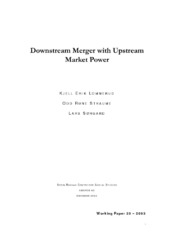| dc.contributor.author | Lommerud, Kjell Erik | eng |
| dc.contributor.author | Straume, Odd Rune | eng |
| dc.contributor.author | Sørgard, Lars | eng |
| dc.date.accessioned | 2006-06-21T14:34:50Z | |
| dc.date.accessioned | 2020-12-10T06:33:39Z | |
| dc.date.available | 2006-06-21T14:34:50Z | |
| dc.date.available | 2020-12-10T06:33:39Z | |
| dc.date.issued | 2003-12 | eng |
| dc.identifier.issn | 1503-0946 | |
| dc.identifier.uri | https://hdl.handle.net/1956/1382 | |
| dc.description.abstract | We examine how a downstream merger affects input prices and, in turn, the profitability of a such a merger under Cournot competition with differentiated products. Input suppliers can be interpreted as ordinary upstream firms, or trade unions organising workers. If the input suppliers are plant-specific, we find that a merger is more profitable than in a corresponding model with exogenous input prices. In contrast to the received literature, we find that it can be more profitable to take part in a merger than being an outsider. For firm-specific input suppliers, on the other hand, results are reversed. We apply our model to endogenous merger formation in an international oligopoly, and show that the equilibrium market structure is likely to be characterised by cross-border merger. | en_US |
| dc.format.extent | 673528 bytes | eng |
| dc.format.mimetype | application/pdf | eng |
| dc.language.iso | eng | eng |
| dc.publisher | Stein Rokkan Centre for Social Studies | eng |
| dc.relation.ispartofseries | Working paper | en |
| dc.relation.ispartofseries | 25-2003 | en |
| dc.title | Downstream Merger with Upstream Market Power | eng |
| dc.type | Working paper | eng |
| dc.subject.nsi | VDP::Samfunnsvitenskap: 200 | nob |
